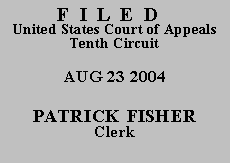

| UNITED STATES OF AMERICA,
Plaintiff-Appellee,
v.
LEONARDO SANCHEZ-SANCHEZ,
also known as Ne Ne Defendant-Appellant. |
No. 03-3175
(D.C. No. 02-CR-20073-02-JWL) (Kansas) |
Mr. Sanchez-Sanchez pleaded guilty in Kansas district court to "knowingly and intentionally distribut[ing] and aid[ing] and abett[ing] . . . [in the distribution of] 100 grams or more of a mixture and substance containing a detectable amount of heroin." Rec., vol. I, doc. 87, at 5, 10. The plea agreement he signed included a waiver of appeal. Aplt. App. at 12. He nevertheless now complains that the government objected to the sentencing calculation in his presentence report, introduced relevant conduct increasing that sentencing calculation, and refused to move for an adjustment for substantial cooperation, all in violation of the contract principles governing his plea. Aplt. Br. at 4-5.
We set forth the analytical framework for such claims in Hahn:
[I]n reviewing appeals brought after a defendant has entered into an appeal waiver, [we] determine: (1) whether the disputed appeal falls within the scope of the waiver of appellate rights; (2) whether the defendant knowingly and voluntarily waived his appellate rights; and (3) whether enforcing the waiver would result in a miscarriage of justice . . . .
359 F.3d at 1325. Clearly, this appeal falls within the scope of Mr. Sanchez-Sanchez's waiver. The plea agreement plainly states that he "waives any right to appeal a sentence imposed which is within the guideline range determined appropriate by the court." Aplt. App. at 12. Mr. Sanchez-Sanchez's sentence is within that range. Rec., vol. III, at 19-20. And Mr. Sanchez-Sanchez knowingly and voluntarily waived the right to appeal. See Aplt. App. at 12.
In determining whether the waiver constitutes a miscarriage of justice, we consider:
[(1) whether] the district court relied on an impermissible factor such as race, [(2) whether] ineffective assistance of counsel in connection with the negotiation of the waiver renders the waiver invalid, [(3) whether] the sentence exceeds the statutory maximum, or [(4) whether the waiver is otherwise unlawful, . . . [meaning] error . . . seriously affect[s] the fairness, integrity or public reputation of judicial proceedings.
Hahn, 359 F.3d at 1327 (citations and quotations omitted). Mr. Sanchez-Sanchez points to no such failings in his plea.
Rather, Mr. Sanchez-Sanchez claims "the purpose of the plea agreement was frustrated," and the government "should have been estopped . . . from presenting evidence of relevant conduct." Aplt. Br. at 5-6. He requests that we remand so he may be sentenced according to the sentencing calculation on record prior to the introduction of relevant conduct. Id.
The difficulty with Mr. Sanchez-Sanchez's argument is that his plea agreement explicitly allowed introduction of relevant conduct evidence and permitted the government to determine whether he had provided substantial assistance prior to moving for a downward departure. Aplt. App. at 8, 10. Mr. Sanchez-Sanchez's attorney also recognized the admissibility of relevant conduct evidence in district court. Rec., vol. II, at 68 ("I'm not suggesting the plea agreement prohibits the government from presenting evidence regarding relevant conduct."). Although the government did not move for a downward departure, which it was not bound to do, the district court gave Mr. Sanchez-Sanchez credit for some cooperation in sentencing him to the low end of the applicable range. Rec., vol. III, at 19-20.
Mr. Sanchez-Sanchez's arguments that this course of events frustrated the purpose of his plea, Aplt. Br. at 5, and that the government was "unjustly enriched" thereby, id. at 6, do not comport with the record. "The plea agreement must be construed according to what defendant reasonably understood at the time he made the agreement." United States v. Prince, 204 F.3d 1021, 1023 (10th Cir. 2000). We cannot conclude that what transpired in district court is anything other than what Mr. Sanchez-Sanchez reasonably should have contemplated.
For the foregoing reasons, we DENY the government's motion to dismiss for lack of subject matter jurisdiction and DISMISS Mr. Sanchez-Sanchez's appeal.
ENTERED FOR THE COURT
Stephanie K. Seymour
Circuit Judge
*.After examining appellant's brief and the appellate record, this panel has determined unanimously that oral argument would not materially assist the determination of this appeal. See Fed. R. App. P. 34(a)(2) and 10th Cir. R. 34.1(G). The case is therefore submitted without oral argument. This order and judgment is not binding precedent, except under the doctrines of law of the case, res judicata, or collateral estoppel. The court generally disfavors the citation of orders and judgments; nevertheless, an order and judgment may be cited under the terms and conditions of 10th Cir. R. 36.3.